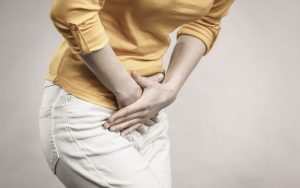Interstitial cystitis is a chronic condition causing bladder pressure and pain, with occasional pain extending into the pelvis. The condition is a part of a spectrum of diseases known as painful bladder syndrome.
Interstitial cystitis occurs when your bladder, which is a hollow, muscular organ that stores urine, sends premature signals to your brain that you need to urinate. Normally these signals are sent once the bladder is full, but those with interstitial cystitis feel the sensation to urinate more often and produce smaller amounts of urine when they go.
Interstitial cystitis most often affects women and can have a long-lasting impact on quality of life. The symptoms may vary from person to person and they may change over time, periodically flaring in response to common triggers, such as menstruation, sitting for a long time, stress, exercise and sexual activity. In many cases symptoms of interstitial cystitis resemble those of a urinary tract infection.
Interstitial cystitis signs and symptoms include:
- Pain in your pelvis or between the vagina and anus in women, the scrotum and anus in men
- Chronic pelvic pain
- A persistent, urgent need to urinate
- Frequent urination, often of small amounts, throughout the day and night (up to 60 times a day)
- Pain or discomfort while the bladder fills and relief after urinating
- Pain during sexual intercourse
The exact cause of interstitial cystitis isn’t known, but it’s likely that many factors contribute. One possible factor is a defect in the protective lining of the bladder which could result in toxic substances in urine to irritate the bladder wall. Other possible but unproven contributing factors include an autoimmune reaction, genetics, infection or allergy.
Interstitial cystitis can result in a number of complications, including reduced bladder capacity, lower quality of life, sexual intimacy problems, and emotional troubles.
There is no current cure for interstitial cystitis, but there are medications and other therapies available that may offer relief. If you’re experiencing chronic bladder pain or urinary urgency and frequency, contact your doctor.
If you are experiencing symptoms of interstitial cystitis and would like to schedule an appointment with a urologist at Flushing Hospital, please call 718-670-.5486.
Flushing Hospital Medical Center has reopened many of its healthcare services. To learn about the safety measures the hospital has taken to protect your health, please visit https://flushinghospital.org/for-our-patients/
All content of this newsletter is intended for general information purposes only and is not intended or implied to be a substitute for professional medical advice, diagnosis or treatment. Please consult a medical professional before adopting any of the suggestions on this page. You must never disregard professional medical advice or delay seeking medical treatment based upon any content of this newsletter. PROMPTLY CONSULT YOUR PHYSICIAN OR CALL 911 IF YOU BELIEVE YOU HAVE A MEDICAL EMERGENCY.

